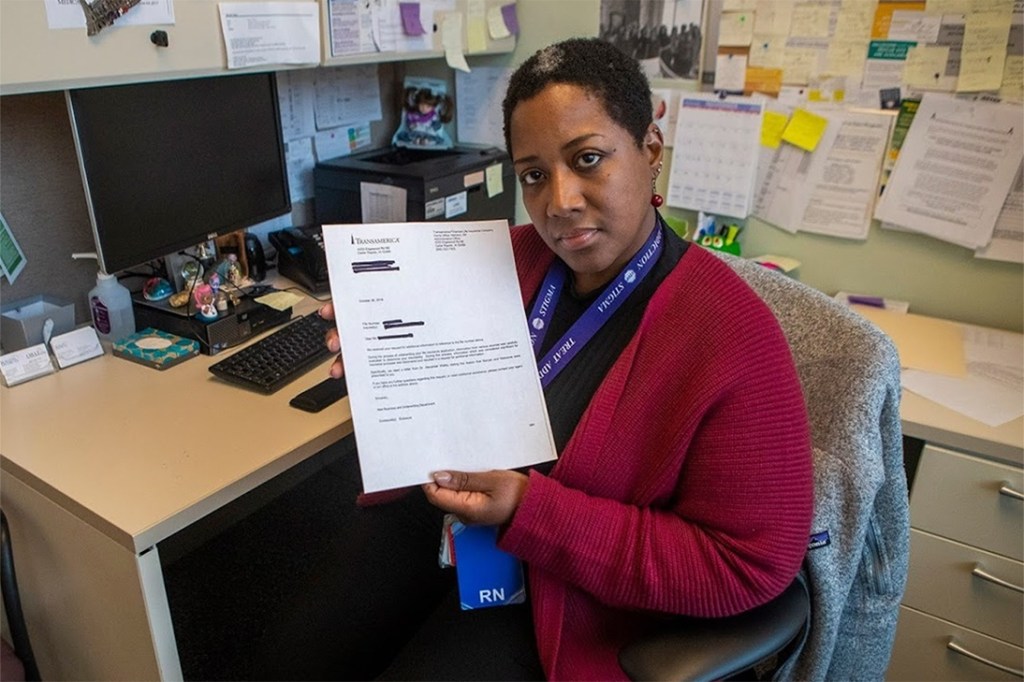Bloodwork was supposed to be the last step in Isela’s application for life insurance. But when she arrived at the lab, her appointment had been canceled.
“That was my first warning,” Isela said. She contacted her insurance agent and was told her application was denied because something on her medication list indicated that Isela uses drugs. Isela, a registered nurse who works in an addiction treatment program at Boston Medical Center, scanned her med list. It showed a prescription for the opioid-reversal drug naloxone — brand name Narcan.
“But I’m a nurse, I use it to help people,” Isela told her agent. “If there is an overdose, I could save their life.”
That’s a message public health leaders aim to spread far and wide. “Be prepared. Get Naloxone. Save a life,” was the message at the top of a summary advisory from the U.S. surgeon general in April.
But some life insurers consider the use of prescription drugs when reviewing policy applicants. And it can be difficult, some say, to tell the difference between someone who carries naloxone to save others and someone who carries naloxone because they are at risk for an overdose.
Primerica is the insurer Isela said turned her down. (NPR and KHN have agreed to use just Isela’s first name because she is worried about how this story might affect her ongoing effort to get life insurance.) The company said it can’t discuss individual cases. But in a prepared statement, Primerica noted that naloxone has become increasingly available over the counter.
“Now, if a life insurance applicant has a prescription for naloxone, we request more information about its intended use as part of our underwriting process,” said Keith Hancock, the vice president for corporate communications. “Primerica is supportive of efforts to help turn the tide on the national opioid epidemic.”
After Primerica turned her down, Isela applied to a second life insurer and was again denied coverage. But the second company told her it might reconsider if she obtained a letter from her doctor explaining why she needs naloxone. So, Isela did contact her primary care physician — and then realized that her doctor had not prescribed the drug.
Isela bought naloxone at a pharmacy. To help reduce overdose deaths, Massachusetts and many other states have established a standing order for naloxone — one prescription that works for everybody. Isela couldn’t just give her insurer that statewide prescription; she had to find the doctor who signed it. As it happens, that physician — Dr. Alex Walley — also works at Boston Medical Center.
Walley is an associate professor of medicine at Boston University; he also works in addiction medicine at Boston Medical Center and is the medical director for the Opioid Overdose Prevention Pilot Program at the Massachusetts Department of Public Health.
“We want naloxone to be available to a wide group of people — people who have an opioid use disorder themselves, but also [those in] their social networks and other people in a position to rescue them,” Walley said.
He said he has written a half-dozen letters for other BMC employees denied life or disability insurance because of naloxone, and that troubles him.
“My biggest concern is that people will be discouraged by this from going to get a naloxone rescue kit at the pharmacy,” Walley said. “So this has been frustrating.”
The life insurance hassle — and threat of being turned down — has discouraged Isela and some of her fellow nurses. She is not carrying a naloxone kit outside the hospital right now because she doesn’t want it to show up on her active medication list until the life insurance problem is sorted out.
“So if something were to happen on the street, I don’t have one — just because I didn’t want another conflict,” Isela said.
BMC has alerted the state’s Division of Insurance, which has said in a written response that it is reviewing the cases and drafting guidelines for “the reasonable use of drug history information in determining whether to issue a life insurance policy.”
But Isela isn’t a drug user. And yet, she is being penalized as if she were.
Michael Botticelli, who runs the Grayken Center for Addiction Medicine at BMC, said friends and family members of patients with an addiction must be able to carry naloxone without fear that doing so will send them to the insurance reject pile.
“It’s incumbent on all of us to make sure that we try to kind of nip this in the bud,” he said, “before it is any more wide-scale.”
Botticelli said increased access to naloxone across Massachusetts is one of the main reasons overdose deaths are down in the state. The most recent state report showed 20 fewer fatalities through the first nine months of 2018 compared with the same period in 2017.
Botticelli relayed his concerns in a letter to Dr. Jerome Adams, the U.S. surgeon general, who says he contacted the National Association of Insurance Commissioners. That group says it has not heard of any cases of life insurance applicants being denied because they purchased naloxone.
Adams said it’s good to — as Botticelli suggests — nip the problem in the bud.
“Naloxone saves lives,” Adams said, “and it is important that all Americans know about the vital role bystanders can play in preventing opioid overdose deaths when equipped with this lifesaving medication.”
Isela said the second company that rejected her has agreed to let her reapply, in light of Walley’s letter stating that she carries the drug so that she can reverse an overdose. Isela is in the process of reapplying.
This story is part of a partnership that includes WBUR, NPR and Kaiser Health News.







